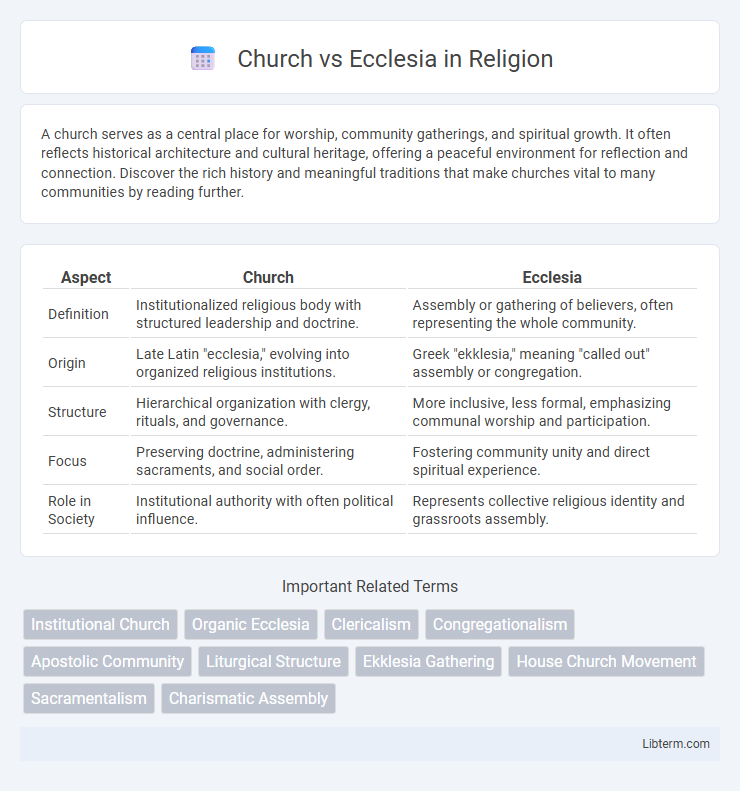A church serves as a central place for worship, community gatherings, and spiritual growth. It often reflects historical architecture and cultural heritage, offering a peaceful environment for reflection and connection. Discover the rich history and meaningful traditions that make churches vital to many communities by reading further.
Table of Comparison
| Aspect | Church | Ecclesia |
|---|---|---|
| Definition | Institutionalized religious body with structured leadership and doctrine. | Assembly or gathering of believers, often representing the whole community. |
| Origin | Late Latin "ecclesia," evolving into organized religious institutions. | Greek "ekklesia," meaning "called out" assembly or congregation. |
| Structure | Hierarchical organization with clergy, rituals, and governance. | More inclusive, less formal, emphasizing communal worship and participation. |
| Focus | Preserving doctrine, administering sacraments, and social order. | Fostering community unity and direct spiritual experience. |
| Role in Society | Institutional authority with often political influence. | Represents collective religious identity and grassroots assembly. |
Defining Church and Ecclesia: Key Differences
Church typically refers to an established Christian community or institution with formal structures, clergy, and doctrines, often emphasizing organized worship and sacraments. Ecclesia, derived from the Greek term for "assembly" or "called-out ones," highlights the broader concept of a gathering or congregation of believers, focusing on the spiritual fellowship rather than institutional hierarchy. Key differences lie in Church representing an institutional body with defined authority, whereas Ecclesia emphasizes the communal and participatory nature of believers united by faith.
Historical Origins of Church and Ecclesia
The historical origins of the Church trace back to the early Christian communities formed after Jesus Christ's resurrection, evolving into organized religious institutions centered around bishops and liturgy. Ecclesia, derived from the Greek word ekklesia meaning "assembly" or "gathering," initially described civic gatherings in ancient Greek city-states and was later adopted by early Christians to denote their collective body. This semantic shift highlights the transition from a political assembly to a religious institution, underpinning the development of Christian ecclesiology and institutional identity.
Linguistic Roots: Meaning of "Church" and "Ecclesia
The term "Church" derives from the Old English word "cirice," which traces back to the Greek "kyriakon," meaning "the Lord's house." In contrast, "Ecclesia" originates directly from the Greek ekklesia, signifying an "assembly" or "called-out ones." This linguistic distinction highlights "Church" as a physical building or institution, while "Ecclesia" emphasizes the community of believers gathered together.
Ecclesia in Early Christian Communities
Ecclesia in early Christian communities referred to the assembly or congregation of believers gathered for worship, teaching, and mutual support, distinct from the institutional Church as an organization. This term emphasized the active participation and communal identity of early Christians who viewed themselves as the called-out people of God, living out their faith in a shared, Spirit-led fellowship. The concept of ecclesia shaped the social and spiritual dynamics of early Christianity, highlighting inclusivity, collective decision-making, and the transformative presence of the Holy Spirit within the community.
The Institutionalization of the Church
The institutionalization of the Church contrasts sharply with the concept of Ecclesia, as the Church evolved into a structured organization with formal hierarchies, doctrines, and rituals codified over centuries. Ecclesia originally referred to a more open assembly of citizens or a community of believers characterized by active participation and less rigid organization. This transition marks the shift from fluid collective gatherings to a centralized institution exerting significant influence over religious, social, and political life.
Church vs Ecclesia in Biblical Context
In the biblical context, "Church" (Greek: ekklesia, ekklesia) refers specifically to the assembly of believers called out from the world, emphasizing a spiritual body united in Christ. "Ecclesia," while the direct Greek term for "church," originally denoted a political assembly or gathering, highlighting its function as a collective group. The New Testament differentiates the Church as a community of faith distinct from secular assemblies, underscoring the divine calling and mission of believers in God's redemptive plan.
Theological Implications of Church and Ecclesia
Theological implications of Church and Ecclesia highlight distinct dimensions of community and authority within Christian doctrine. "Church" often refers to the institutional body with hierarchical structure and doctrinal authority, emphasizing organized worship and ecclesiastical governance. In contrast, "Ecclesia" emphasizes the assembly or gathering of believers, focusing on the communal and participatory nature of faith as seen in early Christian practice.
Modern Interpretations: Church and Ecclesia Today
Modern interpretations of Church and Ecclesia emphasize distinct roles in religious and social contexts, where the Church often denotes institutionalized Christian organizations with hierarchical structures, while Ecclesia signifies broader assemblies of believers or the community of the faithful. In contemporary theology, Ecclesia is increasingly viewed as a dynamic, participatory gathering fostering spiritual unity beyond formal church buildings or denominations. This distinction influences ecumenical dialogue and the evolving understanding of faith communities in pluralistic societies.
Church, Ecclesia, and Christian Identity
Church and Ecclesia both relate to Christian communities but differ in scope and theological emphasis; Church typically denotes the global body of Christian believers, while Ecclesia refers to a specific assembly or congregation within that body. Christian Identity theology often interprets Ecclesia as the true, spiritually pure community of believers, emphasizing a distinct religious and cultural identity. The concept of Church encompasses institutional structures and universal faith, whereas Ecclesia highlights communal worship and direct fellowship among Christians.
Practical Impact: Community, Worship, and Governance
Church emphasizes organized worship services, hierarchical governance, and a defined community of believers with structured rituals promoting unity and spiritual growth. Ecclesia represents a broader concept of an assembly or gathering of people often linked to civic participation, fostering inclusive communal decision-making and shared responsibilities. Understanding the distinction shapes practical approaches to worship style, community engagement, and leadership models within religious and social contexts.
Church Infographic

 libterm.com
libterm.com